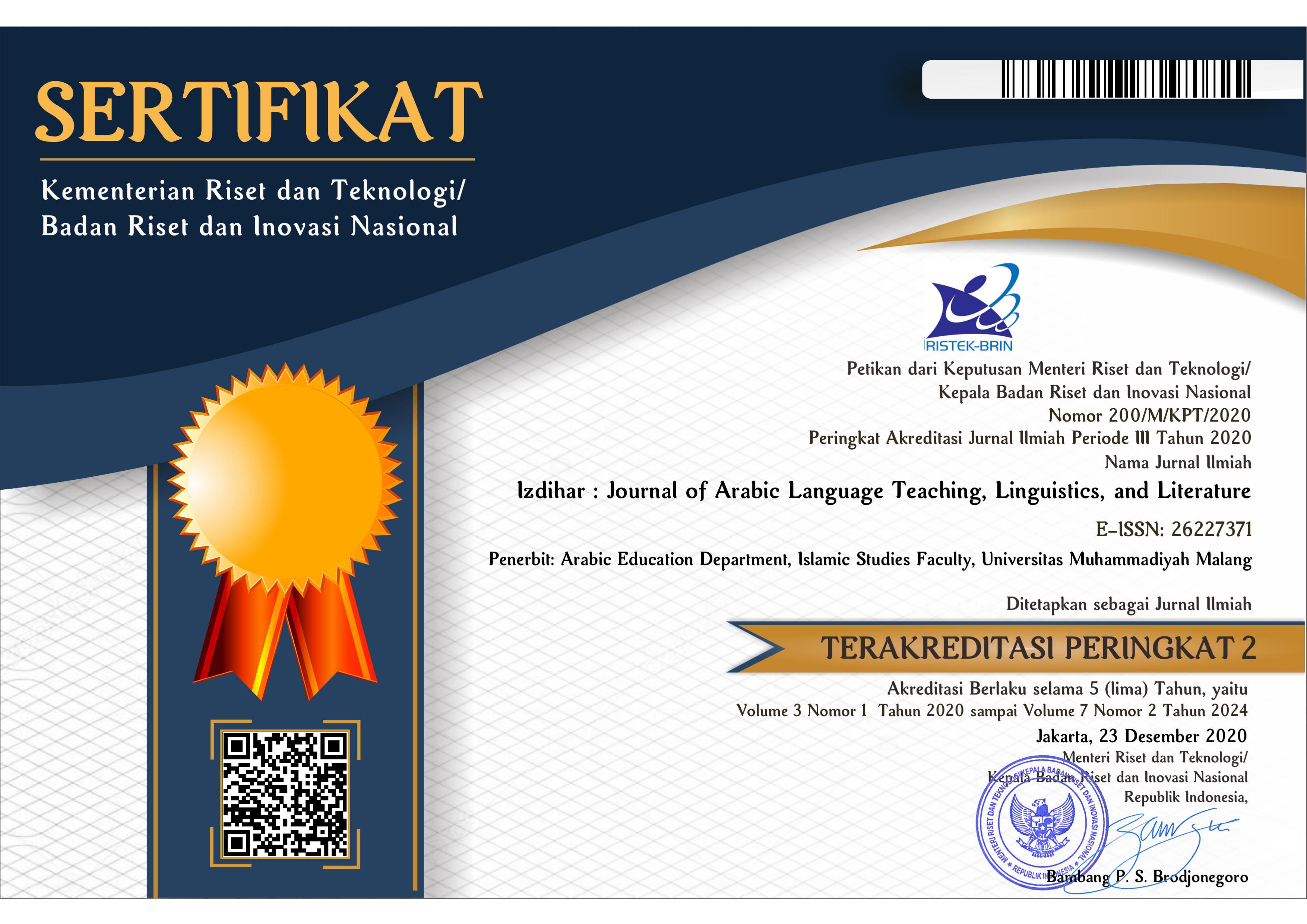Teacher’s Challenges in Implementing HOTS in Learning Arabic During Covid-19 Pandemic
DOI:
https://doi.org/10.22219/jiz.v4i1.15606Keywords:
Arabic Learning, Challenges, Covid-19, HOTSAbstract
HOTS-based Arabic learning in the Covid-19 pandemic era experienced complex problems because the learning process carried out online had an impact on the implementation of HOTS which was not optimal. This research encourages the disclosure of the challenges faced by teachers when implementing HOTS in learning Arabic in the era of the Covid-19 pandemic. This research used a qualitative approach with the case study method in Islamic senior high school (MAN) 3 Padang Panjang West Sumatera, Indonesia. Collecting data was through an in-depth review of observations, interviews, and documents. Meanwhile, the data analysis technique was based on Miles and Huberman's theory by reducing data, presenting data, and concluding field findings. The data obtained were validated with data triangulation techniques and data sources. This study shows that the challenges faced by teachers stem from three main factors, namely; a) from the students' lack of Arabic language skills and uneven internet connection problems in the areas where students live; b) from the teachers' low understanding of the HOTS concept and its application in learning Arabic and; c) from school rules that have not set HOTS standards as a reference in learning. The test of the effectiveness of the application of HOTS skills in Arabic learning needs to be done through an online learning system.
Downloads
References
Abosalem, Y. (2016). Assessment techniques and students’ higher-order thinking skills. International Journal of Secondary Education, 4(1), 1–11. https://doi.org/10.11648/j.ijsedu.20160401.11
Ainin, M. (2018). Penilaian dalam pembelajaran bahasa Arab di madrasah atau sekolah: HOTS, MOTS atau LOTS ? Prosiding Konferensi Nasional Bahasa Arab IV, 155–165. https://prosiding.arab-um.com/index.php/konasbara/article/view/266/252
Al-Maroof, R. S., Salloum, S. A., Hassanien, A. E., & Shaalan, K. (2020). Fear from covid-19 and technology adoption: The impact of google meet during coronavirus pandemic. Interactive Learning Environments, 1–16. https://doi.org/10.1080/10494820.2020.1830121
Alsowat, H. (2016). An EFL flipped classroom teaching model: Effects on English language higher-order thinking skills, student engagement and satisfaction. Journal of Education and Practice, 7(9), 108–121. https://iiste.org/Journals/index.php/JEP/article/view/29629
Audina, N. A., & Mubarak, M. R. (2020). Strategi metakognitif dalam belajar bahasa Arab di era pandemi covid-19 : Analisis persepsi mahasiswa. Proceeding NATHLA : Al-Nadwah Al-‘Alamiyyah Fi Ta’Lim Al-Lughah Al- ‘Arabiyyah (International Conference on Arabic Languange Teaching), 161–166. https://e-proceedings.iain-palangkaraya.ac.id/index.php/natla/article/view/175
Baransi, R. A. J., & Burbara, R. J. (2019). Higher order thinking skills (HOTS) and their contribution to turning the teaching of Arabic reading comprehension into a meaningful process. International Journal of Language & Linguistics, 6(2), 121–132. https://doi.org/10.30845/ijll.v6n2p16
Beddu, S. (2019). Implementasi pembelajaran higher order thinking skills (HOTS) terhadap hasil belajar peserta didik. Jurnal Pemikiran Dan Pengembangan Pembelajaran, 1(3), 71–84. http://ejournal-jp3.com/index.php/Pendidikan/article/view/78
Bulan, S., & Zainiyati, H. S. (2020). Pembelajaran online berbasis media google formulir dalam tanggap work from home masa pandemi covid-19 di Madrasah Ibtidaiyah Negeri (MIN) 1 Paser. SYAMIL: Jurnal Pendidikan Agama Islam (Journal of Islamic Education), 8(1), 15–34. https://doi.org/10.21093/sy.v8i1.2300
Ch, H. (2020). HOTS (higher order thinking skills) through SPPKB (learning strategy for improving thinking ability) in learning"qiroah" reading skills based on contextual learning as implementation of 21st century learning in higher education. Journal International Seminar on Languages, Literature, Arts, and Education (ISLLAE), 2(1), 28–48. https://doi.org/10.21009/ISLLAE.02103
Faiqah, N. (2017). Manajemen pembelajaran bahasa Arab di sekolah (studi kasus di SMK Muhammadiyah 2 Playen Yogyakarta). Jurnal At-Tafkir, 10(1), 64–85. https://doi.org/10.32505/at.v10i1
Faruq, U., & Huda, M. M. (2020). Bahasa Arab berbasis peningkatan pembelajaran HOTS (higher order thinking skills)(kajian pembelajaran bahasa Arab di Madrasah Aliyah unggulan Darul ’Ulum step 2 Kemenag RI). Al-Hikmah: Jurnal Kependidikan, 8(1), 1–20. http://jurnal.staiba.ac.id/index.php/Al-Hikmah/article/view/135/0
Fauzi, M. F., Murdiono, M., Anindiati, I., Nada, A. L. I., Khakim, R. R., Mauludiyah, L., & Thoifah, I. (2020). Developing Arabic language instructional content in canvas LMS for the era and post covid-19 pandemic. Izdihar : Journal of Arabic Language Teaching, Linguistics, and Literature, 3(3), 161–180. https://doi.org/10.22219/jiz.v3i3.15017
Fauziyah, N. (2020). Dampak covid-19 terhadap efektivitas pembelajaran daring pendidikan Islam. Al-Mau’Izhoh, 2(2), 1–11. http://www.jurnal.unma.ac.id/index.php/am/article/view/2294
Febriani, S. R. (2020a). Implementation of Arabic learning during covid-19 emergency in Indonesia: HOTS, MOTS, or LOTS?. Alsinatuna : Journal of Arabic Linguistics and Education, 5(2), 117–129. https://doi.org/10.28918/alsinatuna.v5i2.2494
Febriani, S. R. (2020b). Analisis implementasi pembelajaran bahasa Arab di sekolah dasar: HOTS, MOTS, LOTS ?. Prosiding Konferensi Nasional Bahasa Arab VI (KONASBARA), 20, 432–444. https://prosiding.arab-um.com/index.php/konasbara/article/view/695
Hadiyanto, A., Samitri, C., & Maria Ulfah, S. (2020). Model pembelajaran bahasa Arab multiliterasi berbasis kearifan lokal dan moderasi Islam di perguruan tinggi negeri. Hayula: Indonesian Journal of Multidisciplinary Islamic Studies, 4(1), 117–140. https://doi.org/10.21009/004.01.07
Hasan, H. (2020). Optimalisasi google form dalam pembelajaran bahasa Arab di era pandemi covid-19. Konferensi Nasional Bahasa Arab VI (KONASBARA), 181–192. https://prosiding.arab-um.com/index.php/konasbara/article/view/686
Hastowohadi, Setyaningrum, R. W., & Pangesti, F. (2020). Forced remote learning during the covid-19 outbreak: International students’ stories from a bahasa Indonesia (the indonesian language) for foreigners classroom. Journal of International Students, 10(3), 180–197. https://doi.org/10.32674/jis.v10iS3.3206
Kamarudin, M. Y., Yusoff, N. M. R. N., Yamat, H., & Abdul Ghani, K. (2016). Inculcation of higher order thinking skills (hots) in Arabic language teaching at Malaysian primary schools. Creative Education, 7(02), 307–314. https://doi.org/10.4236/ce.2016.72030
Kiswara, A. B., Murwaningsi, T., & Susantiningrum. (2019). Analisis penerapan pembelajaran berbasis HOTS pada program keahlian otomatisasi tata kelola perkantoran SMK Negeri di kota Surakarta. Jurnal Informasi Dan Komunikasi Administrasi Perkantoran, 3(3), 46–52. https://jurnal.uns.ac.id/JIKAP/article/view/34523
Miles, M. B., & Huberman, A. M. (1994). Qualitative data analysis. Sage Publications.
Mubarak, M. R., Wahdah, N., Ilmiani, A. M., & Hamidah, H. (2020). Zoom cloud meeting: Media alternatif dalam pembelajaran maharah kalam di tengah wabah virus corona (covid-19). Arabiyatuna : Jurnal Bahasa Arab, 4(2), 211–226. https://doi.org/10.29240/jba.v4i2.1445
Muradi, A., Mubarak, F., Darmawaty, R., & Hakim, A. R. (2020). Higher order thinking skills dalam kompetensi dasar bahasa Arab. Arabi: Journal of Arabic Studies, 5(2), 177–190. https://dx.doi.org/10.24865/ajas.v5i2.293
Mustain, M. A. (2019). Pembelajaran bahasa Arab berbasis higher order thinking skills (HOTS). Seminar Nasional Bahasa Arab Mahasiswa III HMJ Jurusan Sastra Arab Fakultas Sastra Universitas Negeri Malang, 386–398. https://prosiding.arab-um.com/index.php/semnasbama/article/view/397
Pardede, P. (2020). Integrating the 4cs into EFL integrated skills learning. Journal of English Teaching, 6(March), 71–85. https://doi.org/10.33541/jet.v6i1.190
Pi’i, P. (2016). Mengembangkan pembelajaran dan penilaian berpikir tingkat tinggi pada mata pelajaran sejarah SMA. Sejarah Dan Budaya: Jurnal Sejarah, Budaya, Dan Pengajarannya, 10(2), 197–208. https://doi.org/10.17977/um020v10i22016p197
Pimada, L. H., & Amrulloh, M. A. (2020). Penerapan media elektronik pada pembelajaran bahasa arab. Lahjah Arabiyah: Jurnal Bahasa Arab Dan Pendidikan Bahasa Arab, 1(2), 120–128. https://doi.org/10.35316/lahjah.v1i2.819
Pimada, L. H., Toba, R., & Rasyidi, A. W. (2020). Learning of imla’ using flashcards on writing skill at islamic elementary school level in Samarinda. Izdihar : Journal of Arabic Language Teaching, Linguistics, and Literature, 3(1), 1–16. https://doi.org/10.22219/jiz.v3i1.11682
Prananingrum, A. V., & Kholis, M. N. (2020). Whatsapp sebagai media pembelajaran bahasa Arab pada masa pandemic covid-19. Proceeding NATHLA : Al-Nadwah Al-‘Alamiyyah Fi Ta’Lim Al-Lughah Al-‘Arabiyyah (International Conference on Arabic Languange Teaching), 129–136. https://e-proceedings.iain-palangkaraya.ac.id/index.php/natla/article/view/166
Pratama, Y., & A’yun, N. Q. (2020). Kelompok belajar mahasiswa di masa pandemi covid-19: Solusi alternatif pemodelan pembelajaran bahasa Arab di era pandemic. MUNASBA: Multaqo Nasional Bahasa Arab, 260–268. https://munasbauai.com/index.php/mnba/article/view/98
Putri, B. A., & Sofyan, F. A. (2019). Analisis kesulitan proses pembelajaran berbasis hots di kelas V SDN 4 Muara Padang. El-Ibtidaiy:Journal of Primary Education, 2(2), 59–73. https://doi.org/10.24014/ejpe.v2i2.7961
Rahmawati, N. (2018). Pembelajaran bahasa Arab: Menuju higher order thinking skills (HOTS). Prosiding Konferensi Nasional Bahasa Arab IV, 6 Oktober, 149–154. http://prosiding.arab-um.com/index.php/konasbara/article/view/265
Ritonga, A. W., Ritonga, M., Nurdianto, T., Kustati, M., Rehani, Lahmi, A., Yasmadi, & Pahri. (2020). E-learning Process of maharah qira’ah in higher education during the covid-19 pandemic. International Journal of Higher Education, 9(6), 227–235. https://doi.org/10.5430/ijhe.v9n6p227
Saleh, S. E. (2019). Critical thinking as a 21st century skill: Conceptions, implementation, and challenges in the EFL classroom. European Journal of Foreign Language Teaching, 4(1), 1–16. https://doi.org/10.5281/zenodo.2542838
Thohir, M., & Muslimah, K. C. (2020). Evaluation of Arabic learning outcomes using google form during school quarantine due to covid-19 pandemic. Studia Religia Jurnal Pemikiran Dan Pendidikan Islam, 4(1), 12–22. https://doi.org/10.30651/sr.v4i2
Tolinggi, S. O. R., & S, F. R. (2020). Optimalisasi pembelajaran bahasa Arab di era adaptasi kebiasaan baru (AKB). Taqdir, 6(2), 95–116. https://doi.org/10.19109/taqdir.v6i2.6428
Wargadinata, W., Maimunah, I., Febriani, S. R., & Humaira, L. (2020). Mediated Arabic language learning for Arabic students of higher education in covid-19 situation. Izdihar : Journal of Arabic Language Teaching, Linguistics, and Literature, 3(1), 1–20. https://doi.org/10.22219/jiz.v3i1.11862
Yayuk, E., Deviana, T., & Sulistyani, N. (2019). Kemampuan guru dalam implementasi pembelajaran dan penilaian HOTS pada siswa kelas 4 sekolah Indonesia Bangkok Thailand. JINoP (Jurnal Inovasi Pembelajaran), 5(2), 107–122. https://doi.org/10.22219/jinop.v5i2.7106
Yin, R. K. (2011). Qualitative research from start to finish. The Guilford Press.
Zafar, S., & Meenakshi, K. (2012). Individual learner differences and second language acquisition; A review. Journal of Language Teaching and Research, 3(4), 639–646. https://doi.org/10.4304/jltr.3.4.639-646
Zohar, A. (1999). Teachers’ metacognitive knowledge and the instruction of higher order thinking. Teaching and Teacher Education, 15(4), 413–429. https://doi.org/10.1016/S0742-051X(98)00063-8
Downloads
Published
How to Cite
Issue
Section
License
Copyright (c) 2021 Apri Wardana Ritonga, Izdihar: Journal of Arabic Language Teaching, Linguistics, and Literature

This work is licensed under a Creative Commons Attribution-ShareAlike 4.0 International License.
Copyright Notice
Authors who publish with this journal agree to the following terms:
- Authors retain copyright and grant the journal right of first publication with the work simultaneously licensed under a Creative Commons Attribution-ShareAlike 4.0 International License that allows others to share the work with an acknowledgment of the work's authorship and initial publication in this journal.
- Authors are able to enter into separate, additional contractual arrangements for the non-exclusive distribution of the journal's published version of the work (e.g., post it to an institutional repository or publish it in a book), with an acknowledgment of its initial publication in this journal.
- Authors are permitted and encouraged to post their work online (e.g., in institutional repositories or on their website) prior to and during the submission process, as it can lead to productive exchanges, as well as earlier and greater citation of published work (See The Effect of Open Access).
Copyright (c) 2019 Izdihar : Journal of Arabic Language Teaching, Linguistics, and Literature

This work is licensed under a Creative Commons Attribution-ShareAlike 4.0 International License.

















